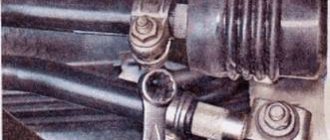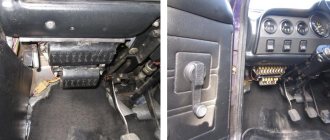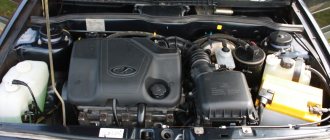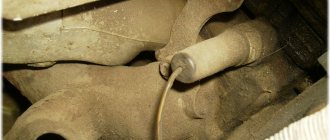The smell of burnt oil in the cabin is one of the most common problems for motorists. Moreover, it is important to note that this unpleasant problem occurs both among owners of budget cars and among owners of expensive models. It’s definitely not possible to drown out the unpleasant aroma and thus get rid of the problem. The root of the problem may be hidden behind serious violations in the car, which can lead to large waste and huge losses of time (car downtime) in the future. The situation is further aggravated by the fact that burnt oil is dangerous to the human body. It is definitely not recommended to delay repairs under the current circumstances. We will try to accurately understand the causes of the violation and determine possible ways of developing the problem.
Why does the car interior smell like burnt oil?
First you need to determine whether the smell appeared and disappeared or whether it is constant. A frequent manifestation of a burnt smell occurs in the spring, at the moment when the sprinkled reagents and other chemicals on the road begin to melt, as a result it gets into the exhaust and begins to evaporate. The higher you keep the speed, the higher the temperature of the exhaust system will be, the more you will feel the burning. Such fumes can be felt when stopping, for example, at a traffic light. The phenomenon is seasonal and passes quickly.
In other cases, it is worth paying attention to recent trips to the service; for example, when changing the oil, the auto mechanic might have poured it on some parts of the engine, naturally not on purpose. In this case, when driving, the engine will heat up, and the spilled oil will begin to evaporate and the problem will be solved in 3-5 days.
A similar situation can arise when replacing any fluid.
The smell of burnt oil in the cabin - stories from practitioners.
Alexey, Kazan:
I have a Volga Cyber, and recently there has been a burning smell in the interior. There is no smoke under the hood, all surfaces are clean. They gave me a lot of advice and I replaced the crankshaft seals, the cylinder head gasket, and the gasket on the exhaust manifold. Nothing helped. Then I went to the service center and they looked at it from below. I have a manual one - the clutch is all covered in oil, and so is the bottom of the box. It looks like it was spraying on the exhaust, which is where the smell came from. After repairs it disappeared.
Nikolai, Gorky:
There is an interesting phenomenon on the Volkswagen Polo Sedan. In winter. When the heater is on, as soon as you stop at a traffic light, a burning smell appears in the cabin. They tried to convince me that the radiator in the stove was leaking, that it was the smell from the carbolite parts of the electric motor, etc. While there was no one at the service center, he told me that the machine has this special feature. (moisture from puddles, snow) falls on the catalyst, and it is next to the internal combustion engine. When you stop, the stove pulls everything into the cabin, and when you move, this fumes are blown away.
Vasily, Tver:
I had a problem with my VAZ 2114: when driving at high speed, the interior smelled of burnt oil. You slow down and the smell disappears. My father-in-law gave me advice - he says that there are only 2 ways to have such a smell - the oil is burning in the cylinders, the exhaust is leaking, or it is pressing on hot parts from somewhere, most often on the exhaust tract. The exhaust was clean, so I discarded the first one. And then I started changing gaskets and seals, and I got rid of it.
Pavel, Yaroslavl:
This is what I encountered on the Chevrolet Niva. At high speeds, the smell of burnt oil enters the interior. The reason for this is the mounting bolt of the drive belt tension mechanism. Everything is simple - it is not sealed, but is screwed into the cavity where the timing chain sprays oil. It flows drop by drop, hits the engine and burns. The solution is simple - screw it onto the sealant (it is clear that this is a one-time solution - unscrew it, apply it again).
Motor
The above problems go away and are solved on their own. But what if the smell was not for these reasons? Understand and search further. There is a list of reasons that need to be looked for in the engine compartment:
- Low oil level in the engine. Normally, the oil level sensor should signal, but it may fail. If this was the cause of the burning, then do not rush to add oil, the engine must first be washed;
- The oil level is significantly higher than normal. Occurs if, during an oil change, you are filled with more oil than required. The oil can be drained or taken with a vacuum pump at a service station;
- Oil leaks from the engine, it may leak from the valve cover, this can be solved by replacing the valve cover;
- Worn seals are leaking. It can be solved by replacing it; it may be pressuring the oil due to its excess in the system;
- The engine drives oil through the breather. In this case, you should definitely go to the service station and eliminate the cause, because this is fraught with engine damage.
If everything is in order under the hood, then you should inspect the transmission.
The main sources of the smell of burnt oil, the reasons for its appearance and how to eliminate them.
Guided by the simple considerations given earlier, you can quickly find the sources and causes of unpleasant odors in the cabin and, naturally, think about ways to eliminate them.
Carrying out repair work, replacing technical fluids and materials.
Special attention should be paid to recent work. It is enough to pour oil over the oil filler neck, carelessly remove the oil filter when replacing (by splashing it on the engine housing or exhaust tract), touch the crankcase ventilation system pipe, violating the quality of the fastening - and the smell of burnt oil in the car interior is guaranteed.
To determine and eliminate the cause of the unpleasant odor, you should carefully examine all the units on which work was carried out and the entire space surrounding them. It is necessary to check all the hoses and pipes around and their connections. There is a high probability that the location of the contamination or leak will be found.
If the examination does not produce results, you will have to move on to searching for more serious causes. Observing the time and frequency of occurrence of odors can provide some assistance in diagnosis (at least in localization). For example, its constant presence can be explained by problems with the transmission, and its appearance only when driving or turning on a fan or heater indicates a source in the engine compartment.
Engine.
Most often, engine oil burns. If even a tiny amount of it gets on the hot engine body, it will affect the air in the cabin - the air intakes of the ventilation system are located above the power unit.
If you have replaced or added oil, first of all inspect the oil filler neck and the space around it. If drips are found on the engine body, carefully rub the area of contamination. Otherwise, the smell in the cabin will remain for 4-7 days - until the oil burns out completely.
The same is done in the case when the oil filter was replaced. It is almost impossible to remove the old one without a few drops (or more often a solid portion) of oil into the surrounding area. If it gets on the engine, exhaust pipe, or catalyst, if you don’t notice it and don’t try to remove the contamination, it will make itself known with a characteristic odor.
The source of the smell can also be overheated engine oil. Reasons for this:
- low oil level in the crankcase;
- engine overheating.
The smell may not appear if there are no leaks in the system. But the situation is quite serious. The oil burns, deposits accumulate on engine parts, and system operation is disrupted.
Overheating of the power unit is a topic for separate consideration. There can be many reasons for it, and each requires its own approach to diagnosis and elimination.
Insufficient oil level in the crankcase is easy to notice - you just need to use the dipstick every morning.
You should not rely on the indicators of devices that operate when the oil pressure decreases. The lights on the dashboard (in older carburetor cars) also do not last forever, and the oil pressure sensors may fail.
If checking with a dipstick shows insufficient oil level in the crankcase, it needs to be topped up. And at the same time ask questions, how long ago did this happen last time, is the engine oil consumption high, what are the reasons for this?
An odor will appear when oil leaks onto the power unit housing due to:
- damage to gaskets caused by wear and aging of the material, malfunctions in the operation of systems;
- leaks through seals.
The valve cover gasket most often burns out and leaks (accompanied by an increased level of oil consumption), somewhat less often - gaskets of other blocks and mechanisms. You can find the malfunction by oil drips on the engine body (drops may remain under the car after parking).
To solve problems, a thorough inspection is required, and if a leak is detected, replacement of failed gaskets is required.
Common causes of the smell of burnt oil are problems with the engine crankcase ventilation system:
- clogged or damaged valve (breather);
- poor-quality fastening or cracks in hoses and pipes;
- malfunctions in the operation of other parts of the system - oil separators, pumps (in forced ventilation systems), etc.
As a rule, this leads to depressurization of the system and the entry of vapors from the crankcase into the engine compartment (they contain products of combustion of oil in the engine cylinders, which causes the smell) or drops of oil on the body of the unit. Clogged channels lead to an increase in pressure in the crankcase and cylinders, which can lead to squeezing out gaskets and the formation of leaks, which will also be accompanied by the smell of burnt oil.
A thorough external inspection of the damaged parts is required (the breather and hoses are easy to install visually), washing or replacing parts if deposits accumulate inside.
Transmission.
A constant smell in the cabin may indicate problems in the gearbox:
- In the mechanical case, it indicates a high degree of bearing wear and squeezing of transmission lubricant into the clutch basket. An additional symptom is oil leaking from the clutch basket area onto the road while parked. The bearing needs to be replaced to fix it.
- In an automatic transmission, wear of parts accompanied by heating and a low level of transmission oil occur. Diagnosing and troubleshooting problems on your own is a difficult task. It is better to conduct testing on computer stands, and for repairs use specialized equipment available in service centers.
For your information! The smell of burning transmission oil is different from the smell produced by burning engine oil.
Other sources.
The source of the smell of burnt oil may be an exhaust system in which a burnout has occurred. It is into it that the engine exhaust gases, which contain, among other things, oil combustion products, are sent.
But even if it is in good working order and intact, an unpleasant odor may appear in the cabin if road chemicals or other substances come into contact with exhaust system parts. A typical example of motorist complaints about the smell in the cabin during the spring melting of snow.
There are other posts on this topic on specialized resources.
Transmission
Problems with the box can result in more serious costs, especially if you do not pay attention to it in time. Here, problems and their solutions will be divided into malfunctions with manual and automatic transmissions.
Manual transmission
In diagnostics, everything is extremely simple here; you just need to inspect the transmission. If there is a leak, you will see an oil stain that cannot be confused with anything. The reason may be that the bearing is worn out, and oil begins to get onto the clutch. The solution is simple, change the bearing, and the cost will depend on the make and model of the car.
Engine as the source of the problem
In most cases, car drivers, when a burning smell appears inside, complain about problems associated with the transmission. However, as practice shows, the root cause of such a turn of events may be malfunctions directly in the engine. Among the possible options, the most common are:
- Presence of oil on the engine body;
- Lack of oil in the crankcase;
- Valve cover gasket burnout;
- Seal leakage;
- Breather clogged.
Oil may also appear on the engine housing due to inaccurate filling. Over time, it begins to burn and intensely release an unpleasant smell of smoke into the car interior. Under normal conditions, the oil burns completely within 5-6 days and the disgusting aroma immediately disappears. If this does not happen, most likely the problem is more serious.











